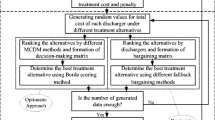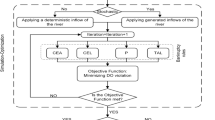Abstract
Various urban, industrial, and agricultural pollutions discharge more than river self-purification potential damages river ecosystem and increases water treatment costs. As different decision-makers and stakeholders are involved in the water quality management in river systems, a new bankruptcy form of the game theory is used to resolve the existing conflict of interests related to waste load allocation in downstream river. The river restoration potential can allocate to the conflicting parties with respect to their claims, by using bankruptcy solution methods. In this research, dischargeable pollution loads to Karun River are determined by pollution sources in various scenarios using bankruptcy methods for conflict resolution. For this purpose, the QUAL2 K river water quality simulation model is integrated with particle swarm optimization model, while various pollution loadings discharge policies have been determined based on bankruptcy method. This method was employed in one of the most pollutant rivers of southern Iran. As the salinity is one of the most important problems in the Karun River, the electrical conductivity is considered as water quality index. The results show that the proposed model for waste load allocation can reduce the salinity of the allocated water demands as well as the salinity discharged into the river. It should be noted that the suggested method does not necessarily minimize the total cost of wastewater treatment in the basin and might result in suboptimal allocations from an economic optimization method. But it should be the emphasis that this method can be used to develop practical solutions when utility information is not available or reliable, side payments are not feasible, and parties are not highly cooperative.


Similar content being viewed by others
References
Abed-Elmdoust A, Kerachian R (2012) Water resources allocation using a cooperative game with fuzzy payoffs and fuzzy coalitions. Water Resour Manag 26:3961–3976
Ansink E, Weikard H-P (2012) Sequential sharing rules for river sharing problems. Soc Choice Welfare 38:187–210
Arjoon D, Tilmant A, Herrmann M (2016) A new framework for resolving conflicts over transboundary rivers using bankruptcy methods. Hydrol Earth Syst Sci 20:2135–2150
Chapra SC, Pelletier GJ, Tao H (2008) QUAL2 K: a modeling framework for simulating river and stream water quality, version 2.11: documentation and user’s manual. Civil and Environmental Engineering Dept., Tufts University, Medford, MA
Dehghan Manshadi H, Nikosokhan MH, Ardestani M (2015) A quantity-quality model for inter-basin water transfer system using game theoretic and virtual water approaches. Water Resour Manag 29:4573–4588
Herrero C, Villar A (2001) The three musketeers: four classical solutions to bankruptcy problems. Math Soc Sci 42:307–328
Kampas A, White B (2003) Selecting permit allocation rules for agricultural pollution control: a bargaining solution. Ecol Econ 47:135–147
Kerachian R, Karamouz M (2007) A stochastic conflict resolution model for water quality management in the reservoir–river systems. Adv Water Resour 30:866–882
Kerachian R, Fallahnia M, Bazargan-Lari MR, Mansoori A, Sedghi H (2010) A fuzzy game theoretic approach for groundwater resources management: application of Rubinstein Bargaining Theory. Resour Conserv Recycl 54(10):673–682. https://doi.org/10.1016/j.resconrec.2009.11.008
Liu D, Guo S, Shao Q, Jiang Y, Chen X (2014) Optimal allocation of water quality and waste load in the northwest Pearl River Delta, China. Stoch Environ Res Risk A 28(6):1525–1542
Madani K (2010) Game theory and water resources. J Hydrol 381:225–238
Madani K, Dinar A (2013) Exogenous regulatory institutions for sustainable common pool resource management: application to groundwater. Water Resour Econ 2–3:57–76. https://doi.org/10.1016/j.wre.2013.08.001
Madani K, Zarezadeh M (2012) Bankruptcy methods for resolving water resources conflicts. In: World environmental and water resources congress 2012: crossing boundaries, pp 2247–2252
Madani K, Zarezadeh M, Morid S (2014) A new framework for resolving conflicts over transboundary rivers using bankruptcy methods. Hydrol Earth Syst Sci 18:3055–3068
Mahjouri N, Bizhani-Manzar M (2013) Waste load allocation in rivers using fallback bargaining. Water Resour Manag 27:2125–2136
Mianabadi H, Mostert E, Zarghami M, Giesen N (2014) A new bankruptcy method for conflict resolution in water resources allocation. J Environ Manage 144:152–159
Nikoo R, Kerachian R, Karimi A, Azadnia A, Jafarzadegan K (2013) Optimal water and waste load allocation in reservoir-river systems: a case study. Environ Earth Sci 71:4127–4142
Sechi GM, Zucca R (2015) Water resource allocation in critical scarcity conditions: a bankruptcy game approach. Water Resour Manag 29:541–555
Sheikhmohammady M, Madani K (2008) Sharing a multi-national resource through bankruptcy procedures. World Environmental and Water Resources Congress, Ahupua’a
Tavakoli A, Nikoo MR, Kerachian R, Soltani M (2015) River water quality management considering agricultural return flows application of a non-linear two-stage stochastic fuzzy programming. Environ Monit Assess 187(4):158
Acknowledgements
The authors wish to thank all who assisted in conducting this work.
Author information
Authors and Affiliations
Corresponding author
Additional information
Editorial responsibility: M. Abbaspour.
Rights and permissions
About this article
Cite this article
Aghasian, K., Moridi, A., Mirbagheri, A. et al. A conflict resolution method for waste load reallocation in river systems. Int. J. Environ. Sci. Technol. 16, 79–88 (2019). https://doi.org/10.1007/s13762-018-1993-3
Received:
Revised:
Accepted:
Published:
Issue Date:
DOI: https://doi.org/10.1007/s13762-018-1993-3




